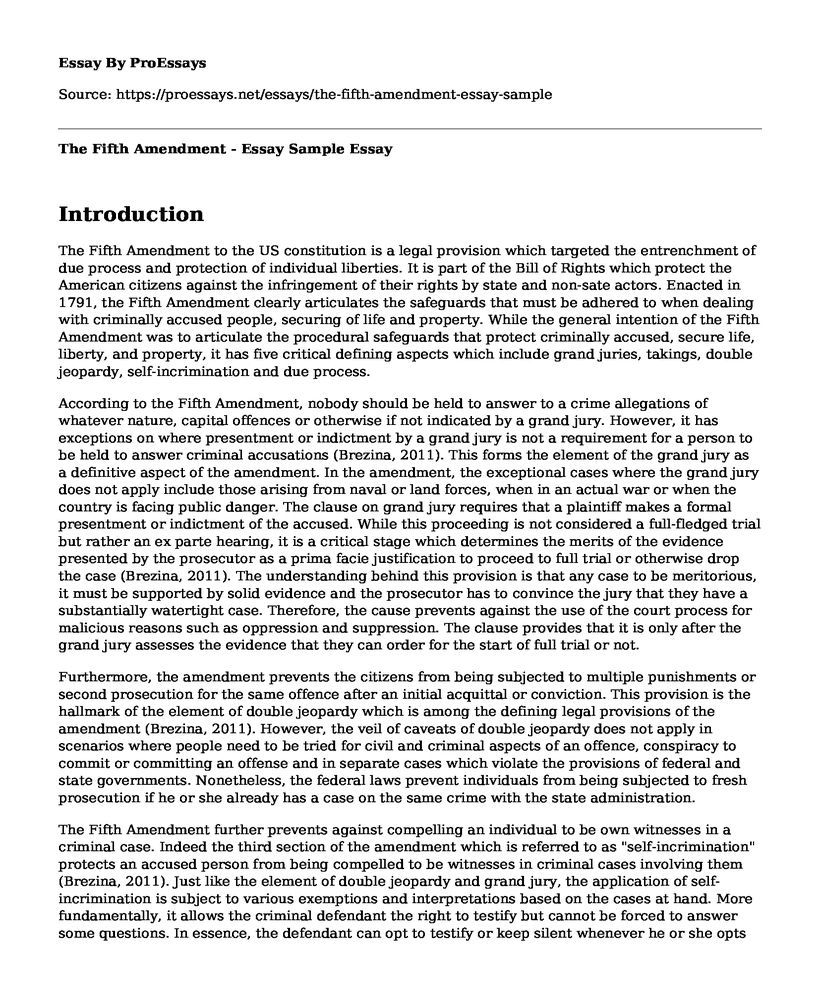Introduction
The Fifth Amendment to the US constitution is a legal provision which targeted the entrenchment of due process and protection of individual liberties. It is part of the Bill of Rights which protect the American citizens against the infringement of their rights by state and non-sate actors. Enacted in 1791, the Fifth Amendment clearly articulates the safeguards that must be adhered to when dealing with criminally accused people, securing of life and property. While the general intention of the Fifth Amendment was to articulate the procedural safeguards that protect criminally accused, secure life, liberty, and property, it has five critical defining aspects which include grand juries, takings, double jeopardy, self-incrimination and due process.
According to the Fifth Amendment, nobody should be held to answer to a crime allegations of whatever nature, capital offences or otherwise if not indicated by a grand jury. However, it has exceptions on where presentment or indictment by a grand jury is not a requirement for a person to be held to answer criminal accusations (Brezina, 2011). This forms the element of the grand jury as a definitive aspect of the amendment. In the amendment, the exceptional cases where the grand jury does not apply include those arising from naval or land forces, when in an actual war or when the country is facing public danger. The clause on grand jury requires that a plaintiff makes a formal presentment or indictment of the accused. While this proceeding is not considered a full-fledged trial but rather an ex parte hearing, it is a critical stage which determines the merits of the evidence presented by the prosecutor as a prima facie justification to proceed to full trial or otherwise drop the case (Brezina, 2011). The understanding behind this provision is that any case to be meritorious, it must be supported by solid evidence and the prosecutor has to convince the jury that they have a substantially watertight case. Therefore, the cause prevents against the use of the court process for malicious reasons such as oppression and suppression. The clause provides that it is only after the grand jury assesses the evidence that they can order for the start of full trial or not.
Furthermore, the amendment prevents the citizens from being subjected to multiple punishments or second prosecution for the same offence after an initial acquittal or conviction. This provision is the hallmark of the element of double jeopardy which is among the defining legal provisions of the amendment (Brezina, 2011). However, the veil of caveats of double jeopardy does not apply in scenarios where people need to be tried for civil and criminal aspects of an offence, conspiracy to commit or committing an offense and in separate cases which violate the provisions of federal and state governments. Nonetheless, the federal laws prevent individuals from being subjected to fresh prosecution if he or she already has a case on the same crime with the state administration.
The Fifth Amendment further prevents against compelling an individual to be own witnesses in a criminal case. Indeed the third section of the amendment which is referred to as "self-incrimination" protects an accused person from being compelled to be witnesses in criminal cases involving them (Brezina, 2011). Just like the element of double jeopardy and grand jury, the application of self-incrimination is subject to various exemptions and interpretations based on the cases at hand. More fundamentally, it allows the criminal defendant the right to testify but cannot be forced to answer some questions. In essence, the defendant can opt to testify or keep silent whenever he or she opts to do so without being subjected to sanctions as a result of declining to testify (Brezina, 2011). However, when a criminal defender takes the stand, he is deemed to have waived the protection against self-incrimination. According to this section of the amendment, the jurors are prevented from refraining from using the defendant's choice not to testify as an admission of their guilt.
The element of due process which forms the fourth clause of the fifteenth amendment protects private property, life and liberties from infringement by the federal government. The fundamental concern of the clause is to foster fairness and justice (Brezina, 2011). It ensures that in any case deprivation of property, rights and life of an individual has to be effected then the process must meet the stipulations of procedural safeguards. The due process clause has both substantive and procedural considerations attached to its enforcement. In fact, it is on this provision that two separate paradigms of due process jurisprudence which includes procedural and substantive jurisprudence are premised.
Conclusion
While the Fifth Amendment protects property through the due process clause, its takings clause which confers on the federal government the authority to acquire private property. It is based on the concept that the best government is that which yields the greatest good for the greatest number hence can at any time acquire private property without unnecessary sanctions (Brezina, 2011). In fact, while the due process provision entrenches justice, the takings clause emphasizes on fairness in the distribution of wealth and property.
References
Brezina, C. (2011). The Fifth Amendment: Double Jeopardy, Self-Incrimination, and Due Process of Law (e-Book). New York: Rosen Digital.
Cite this page
The Fifth Amendment - Essay Sample. (2022, Nov 08). Retrieved from https://proessays.net/essays/the-fifth-amendment-essay-sample
If you are the original author of this essay and no longer wish to have it published on the ProEssays website, please click below to request its removal:
- Meth Epidemic
- Monroe Doctrine
- How Does Interest Groups Influence the Policy-Making Process Essay
- Historical Development of Capital Punishment and Religion Essay
- Essay Sample on Restoring Democracy: A Change for the Better in Our Country
- Essay Sample on Trump's Tariff: Impact on US Economy
- Marijuana Legalization: Two-Thirds of Americans Now Support Its Use - Essay Sample







